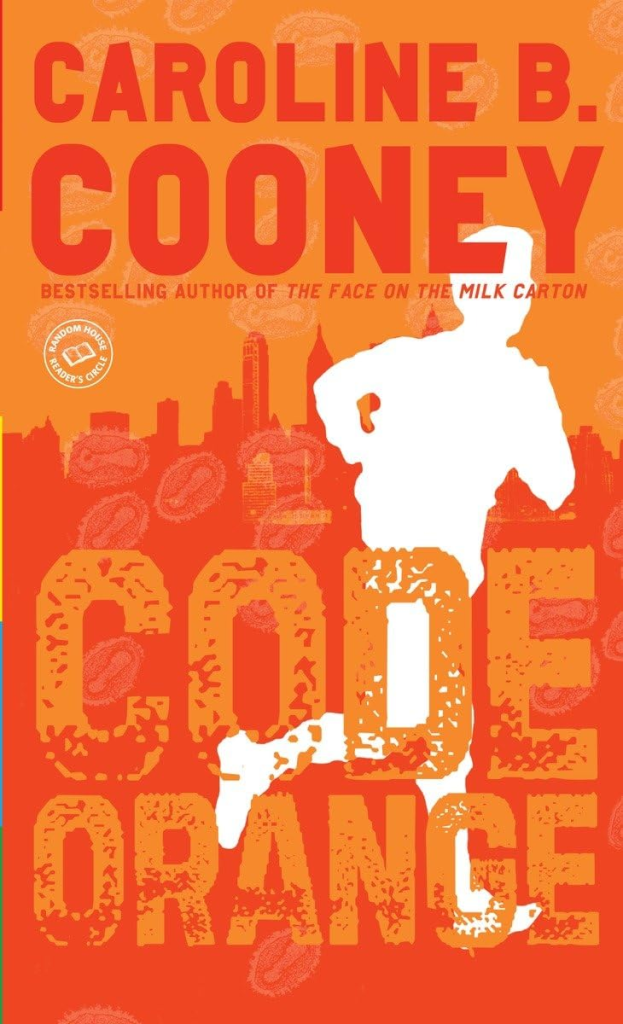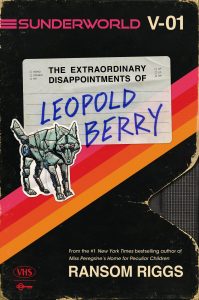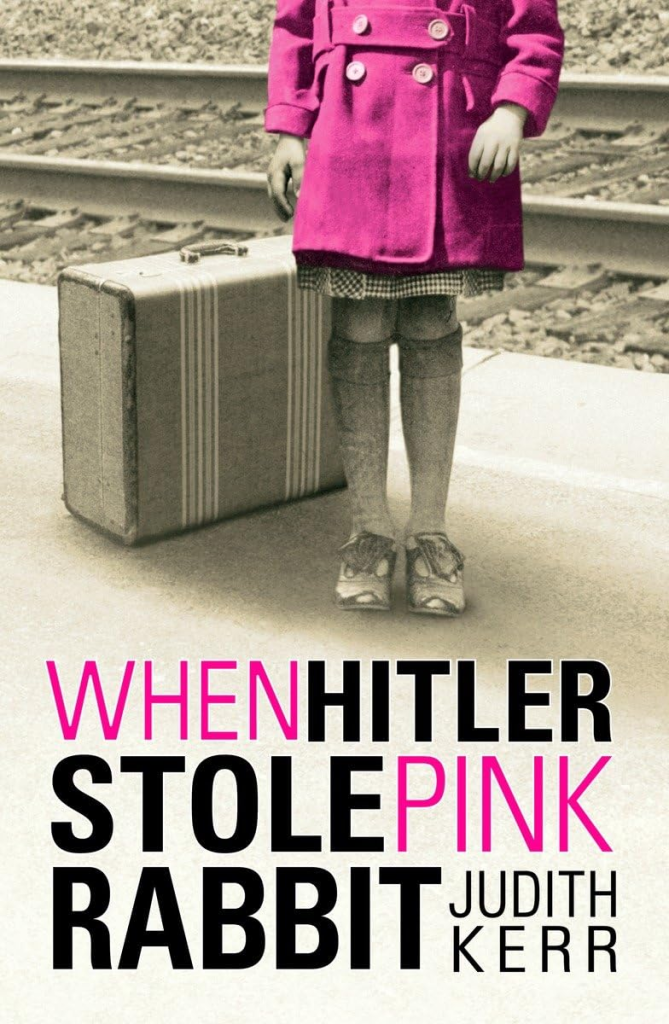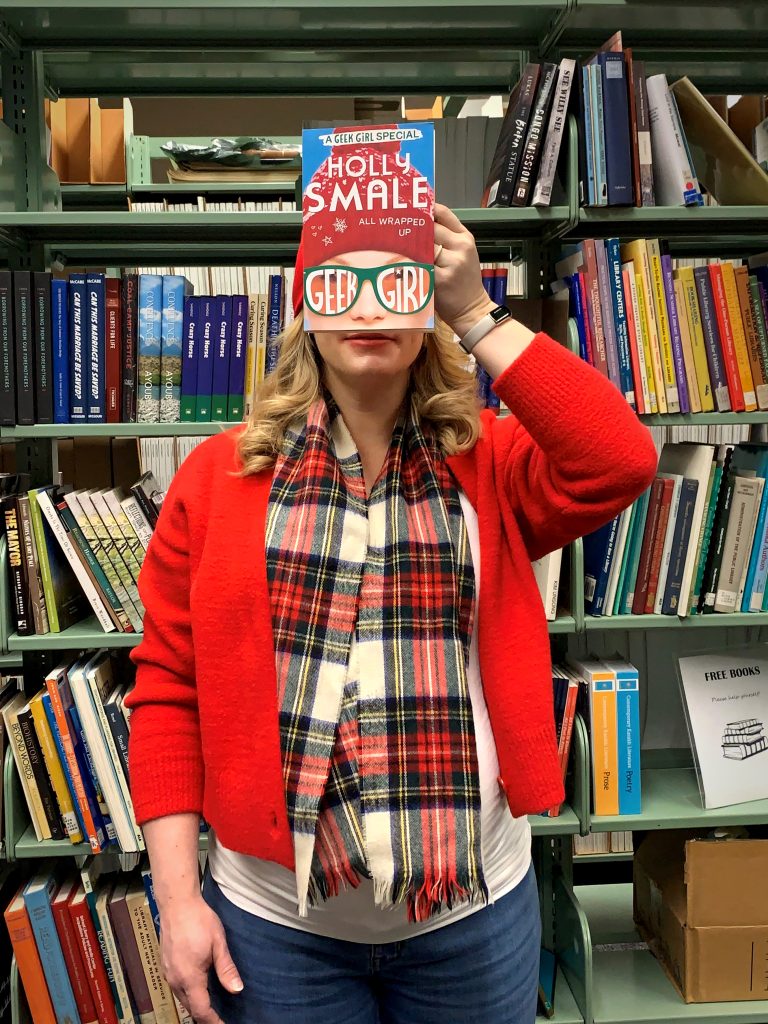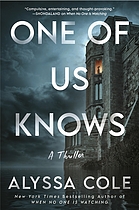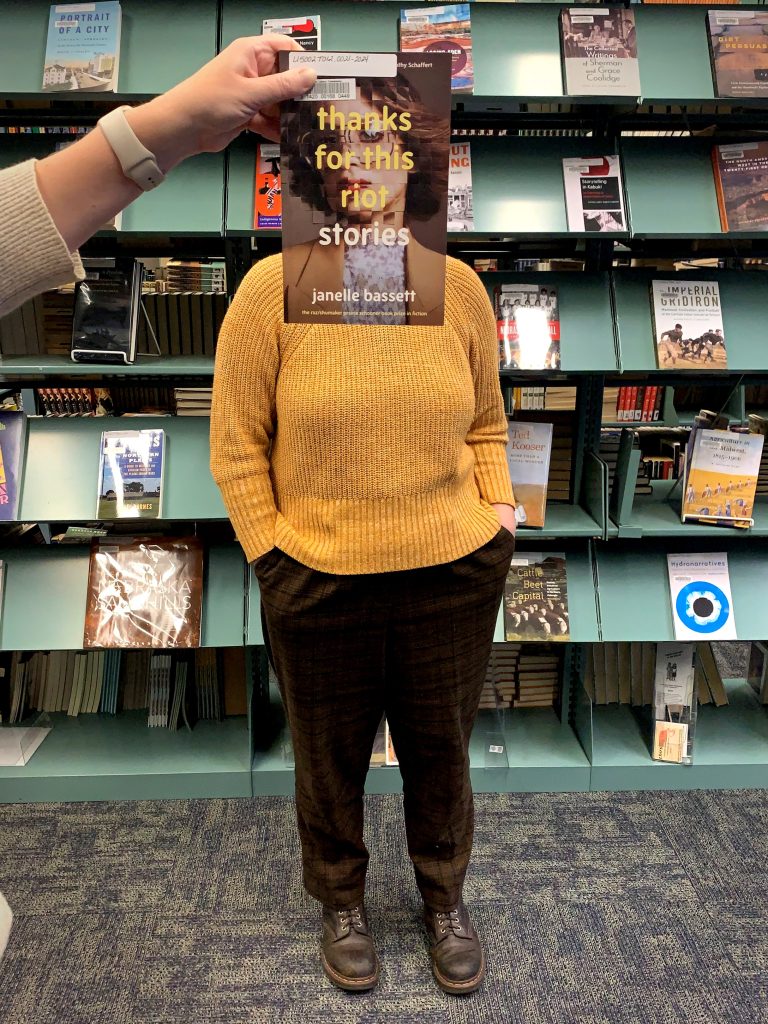Search the Blog
Categories
- Books & Reading
- Broadband Buzz
- Census
- Education & Training
- Friday Reads
- General
- Grants
- Information Resources
- Library Management
- Nebraska Center for the Book
- Nebraska Libraries on the Web
- Nebraska Memories
- Now hiring @ your library
- Preservation
- Pretty Sweet Tech
- Programming
- Public Library Boards of Trustees
- Public Relations
- Talking Book & Braille Service (TBBS)
- Technology
- Uncategorized
- What's Up Doc / Govdocs
- Youth Services
Archives
Subscribe
Tag Archives: Reading
#BookFaceFriday “Tuck Everlasting” by Natalie Babbitt
This #BookFace could go on and on forever!

Can’t stop, won’t stop with this week’s #BookFaceFriday! First published in 1975, “Tuck Everlasting” by Natalie Babbitt (Farrar, Straus and Giroux,2007) was an early Golden Sower nominee and is still a mainstay in classrooms across the country.
We have 11 copies for your reading group to borrow in our Book Club Kit collection, and you can also find it in audiobook format in the Nebraska OverDrive Libraries. It’s only one of many book club kits school and public libraries can borrow for their school-aged reading groups. You can browse our collection by genre, grade level, or keyword search; use the keywords “Golden Sower” to find all the titles we have that have won or been nominated for the award. Best of all, loan periods are flexible to meet your group’s needs!“Rarely does one find a book with such prose. Flawless in both style and structure, it is rich in imagery and punctuated with light fillips of humor. The author manipulates her plot deftly, dealing with six main characters brought together because of a spring whose waters can bestow everlasting life. . . . Underlying the drama is the dilemma of the age-old desire for perpetual youth”
— The Horn Book Magazine
Book Club Kits Rules for Use
- These kits can be checked out by the librarians of Nebraska libraries and media centers.
- Circulation times are flexible and will be based upon availability. There is no standard check-out time for book club kits.
- Please search the collection to select items you wish to borrow and use the REQUEST THIS KIT icon to borrow items.
- Contact the Information Desk at the Library Commission if you have any questions: by phone: 800/307-2665, or by email: Information Services Team
Love this #BookFace & reading? Check out our past #BookFaceFriday photos on the Nebraska Library Commission’s Facebook page!
#BookFaceFriday “Sonny Boy: a Memoir” by Al Pacino
Say hello to my little #BookFaceFriday!
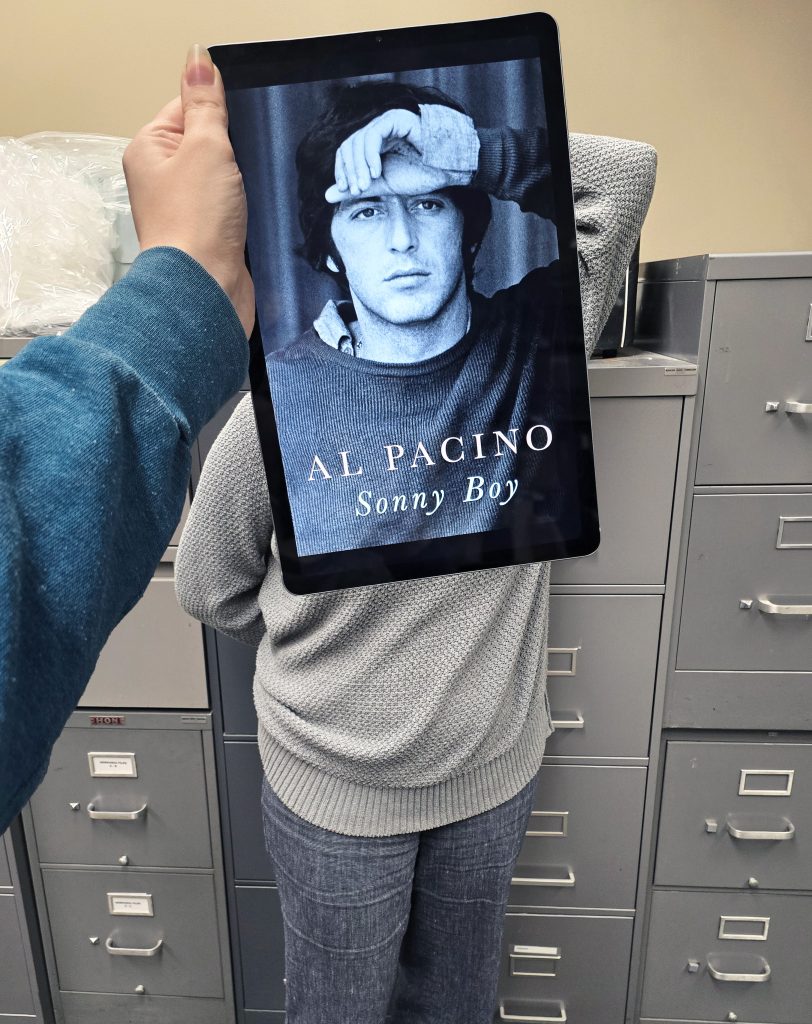
This #BookFaceFriday wants to make you an offer you can’t refuse! “Sonny Boy” by Al Pacino (Penguin, 2024), is an intimate journey into the life of a Hollywood legend, with its highs and lows, and all the drama in between. Hoo-ah! It’s available as an eBook and Audiobook through Nebraska OverDrive Libraries, and is only one of many performing arts biographies and autobiographies available on OverDrive.
“The rare celebrity memoir that’s also a literary read. As funny as it is reflective, it shares stories behind Pacino’s hardscrabble upbringing, classic films and journey to icon status.”
— People Magazine
Libraries participating in the Nebraska OverDrive Libraries Group currently have access to a shared and growing collection of digital downloadable audiobooks and eBooks. 194 libraries across the state share the Nebraska OverDrive collection of 26,898 audiobooks, 36,794 ebooks, and 5,133 magazines. As an added bonus it includes 130 podcasts that are always available with simultaneous use (SU), as well as SU ebooks and audiobook titles that publishers have made available for a limited time. If you’re a part of it, let your users know about this great title, and if you’re not a member yet, find more information about participating in Nebraska Overdrive Libraries!
Love this #BookFace & reading? We suggest checking out all the titles available for book clubs at http://nlc.nebraska.gov/ref/bookclub. Check out our past #BookFaceFriday photos on the Nebraska Library Commission’s Facebook page!
Posted in Books & Reading, General
Tagged Al Pacino, Book Covers, bookface, bookfacefriday, books, Celebrity Memoir, Memoir, Nebraska OverDrive Libraries, Reading, Sonny Boy
Leave a comment
Book Club Spotlight – Code Orange
The prolific author, Caroline B. Cooney is best known for her suspenseful YA books, most notably her 1990 novel, The Face on the Milk Carton. A lifelong learner, when Cooney turned fifty, she moved to Manhattan for school, inspiring the setting for today’s spotlight Code Orange. Cooney’s novel takes place in 2004, a time when the city is still marred by the tragedy of the September 11th attacks, but recovering. Exploring through the eyes of a native New Yorker who feels an immense sense of pride and civic duty, we see how a child’s psyche can be unmistakably shaken by threats on his home, especially when he believes he is the key to the terrorist’s next attack.
A biology assignment. An old book. An envelope. Scabs turning to dust. Before Mitty Blake can realize what’s happening, he’s possibly infected with one of the world’s oldest and most deadly diseases. Smallpox! Just days ago, Mitty was a laid-back teenager, who didn’t care about schoolwork or history. And now he’s fighting for his life, afraid that he is about to subject New York City and the world to an outbreak that could leave millions dead in its wake, especially if the wrong people were to find out his secret.
“The city would go through hell, all because Mitty Blake had done his homework for a change.”
Caroline B. Cooney
Cooney writes in a young teen voice that’s not only realistic but fun! Despite the weight of the world on his shoulders, Mitty is funny, charming, and a little self-deprecating. What makes Code Orange stand out from other YA thrillers, is that commitment to well-researched science. Not only does Cooney include a bibliography at the end, but her work was commended by the National Science Teachers Association as an “Outstanding Science Trade Book for Students K-12”. The reader learns all about smallpox and effective ways to research alongside Mitty as he goes on his adventure. Written in 2005, Code Orange is surprisingly still relevant. Mitty’s fear of quarantine and what viruses can do to the body gives an interesting reflection to the COVID-19 pandemic that would come almost 15 years later. And like in the novel, the CDC is still on guard for threats of smallpox bioterrorism. Students and Adult Book Club Groups can compare how Cooney described the spread of the disease through New York City against how it happened in real-time, and discuss what has and hasn’t changed in the past 20 years regarding how we handle illness, internet safety, and the duty to our home.
If you’re interested in requesting Code Orange for your book club, you can find the Request Form here. There are 23 copies. (A librarian must request items)
Cooney, Caroline B. Code Orange. Random House. 2005
#BookFaceFriday “Shark Teeth” by Sherri Winston
Sink your teeth into a good #BookFaceFriday!
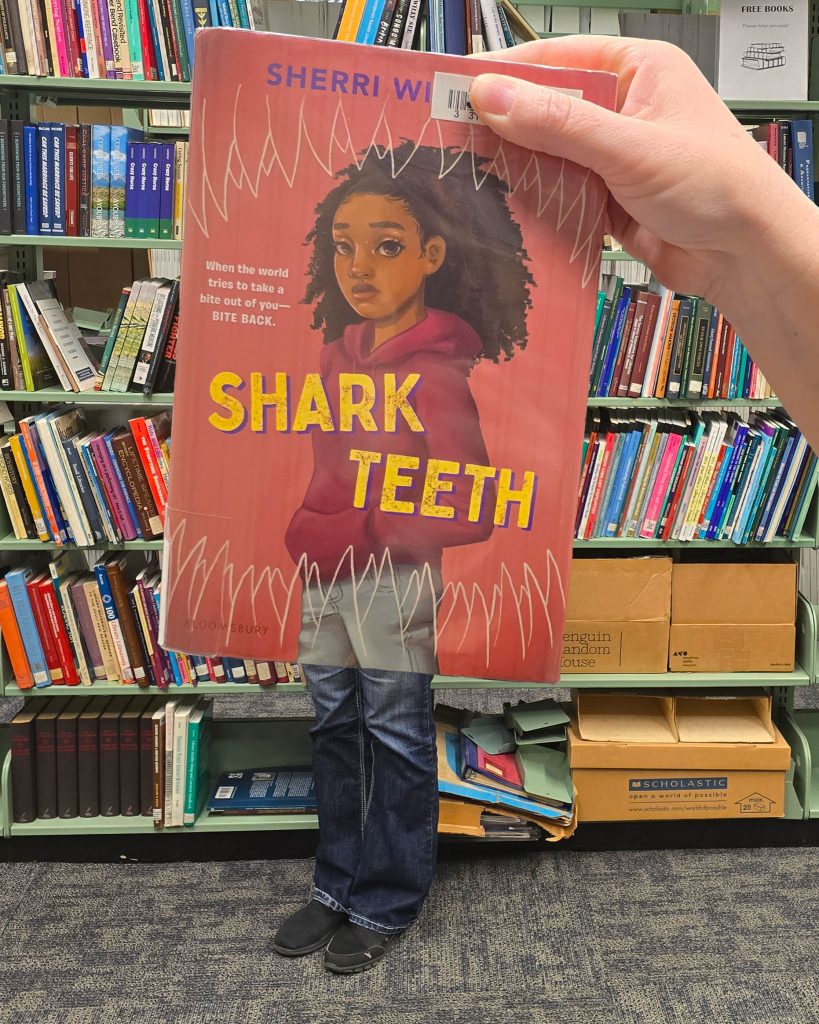
Cue the Jaws theme song! This week’s #BookFace, “Shark Teeth” by Sherri Winston (Bloomsbury, 2024) was 1 of 193 titles featured in School Library Journal’s “Best Books of 2024.” A middle grade novel, geared towards readers in grades 5 and up, it’s the heart-wrenching tale of a young girl trying to keep her family together at any cost. The topics covered are heavy ones, but sadly very real issues for many kids.
“Driven by an intelligent and complex protagonist, this courageous story about strength in the face of neglect, and the bravery to demand what is best of one’s family and oneself, is potent and powerful.”
—Publishers Weekly, starred review
The Nebraska Library Commission receives a large number of children’s and young adult books sent to us as review copies from book publishers. When our Children and Young Adult Library Services Coordinator, Sally Snyder, is done with them, the review copies are available for the Library System Directors to distribute to school and public libraries in their systems. You can see some of her favorites of the past year in the recent NCompass Live webinar episodes: Best Teen Reads of 2024 and Best Children’s Books of 2024.
Love this #BookFace & reading? Check out our past #BookFaceFriday photos on the Nebraska Library Commission’s Facebook page!
Friday Reads – The Extraordinary Disappointments of Leopold Berry by Ransom Riggs
Leopold “Larry” Berry is average, perfectly average, if you believe the results of his aptitude test given by the pricey college admissions counselor his father hired. And in the Berry household “average” equates to “failure”. The boy is a dreamer, spending his free time tinkering with his late mother’s old car and recreating scenes from an old TV show he found on VHS. Absolutely hopeless!
What Larry’s dad doesn’t know is that the old TV show, “Max’s Adventures in Sunderworld”, is not merely a corny, poorly-filmed fantasy series. It’s also one of his only connections to his mom, who died when Larry was 12. But Larry is starting to suspect that Sunder is more than make-believe; could it be a real world that exists below (or next to? inside of?) his hometown of Los Angeles? Lately, it seems the line between Sunder and the real world is blurring. Larry is seeing things that don’t (or shouldn’t) exist in his world. Worried that he is losing his mind, Larry confesses his experiences to his best friend Emmett, and the two set off to find out why Sunder is revealing itself to Larry. Will they find something truly extraordinary? Or will it just be another in a long list of extraordinary disappointments?
This is the first book in a new Young Adult fantasy series, Sunderworld by Ransom Riggs, the author of the Miss Peregrine’s Peculiar Children series. The second book will be released in fall 2025.
Riggs, Ransom. (2024). The Extraordinary Disappointments of Leopold Berry. Dutton Books for Young Readers.
Posted in Books & Reading, Friday Reads, General
Tagged art history, art theft, books, Da Vinci, Friday Reads, middle grade, Mona Lisa, narrative nonfiction, Reading, True Crime
Leave a comment
#BookFaceFriday “The Joy Luck Club” by Amy Tan
Fortune smiles on the #BookFace!
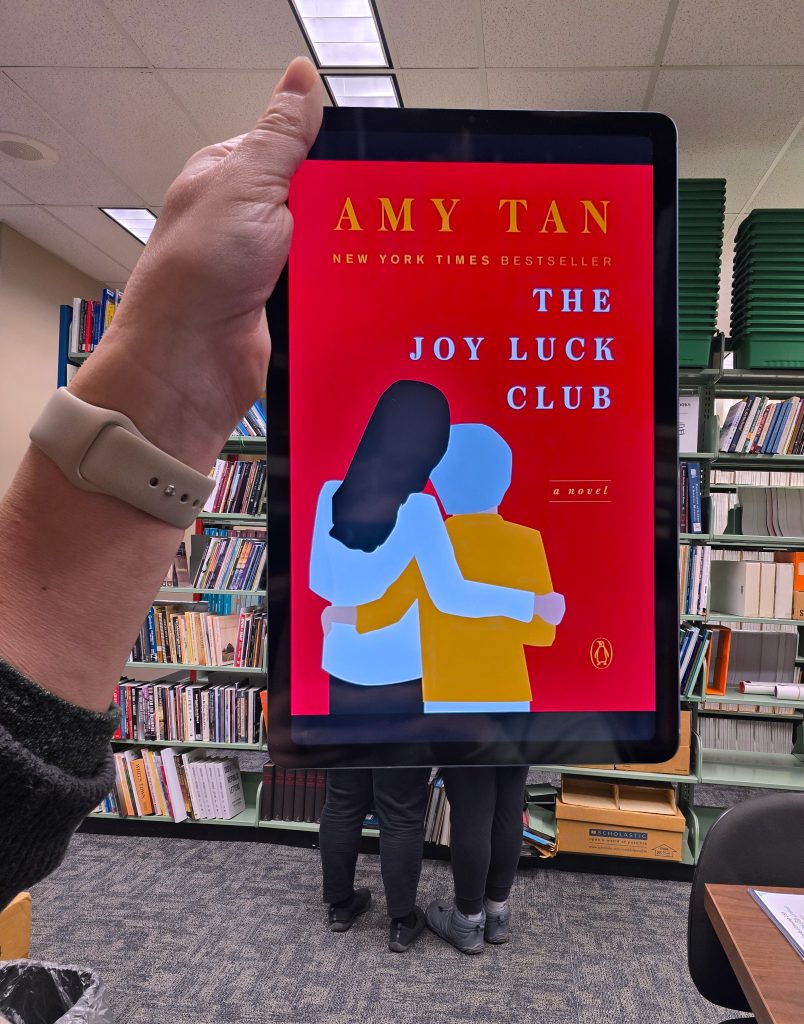
Jump for joy, it’s #BookFaceFriday with “The Joy Luck Club” by Amy Tan (Ballantine Books, 1989)! Now considered a “modern classic”, Tan didn’t have high expectations for her first novel.
Decades (and numerous awards) later, she can joyfully admit she was wrong; her debut was a bestseller that is still a book club “best bet” today! Read Mackenzie Marrow’s excellent Book Club Spotlight review to find out even more about this title and its legacy. We have 14 copies for your reading group to borrow in our Book Club Kit collection, and you can also find it in eBook format in the Nebraska OverDrive Libraries “Joy Revolution” curated collection.“Wonderful…a significant lesson in what storytelling has to do with memory and inheritance.”
— San Francisco Chronicle
Book Club Kits Rules for Use
- These kits can be checked out by the librarians of Nebraska libraries and media centers.
- Circulation times are flexible and will be based upon availability. There is no standard check-out time for book club kits.
- Please search the collection to select items you wish to borrow and use the REQUEST THIS KIT icon to borrow items.
- Contact the Information Desk at the Library Commission if you have any questions: by phone: 800/307-2665, or by email: Information Services Team
Love this #BookFace & reading? Check out our past #BookFaceFriday photos on the Nebraska Library Commission’s Facebook page!
Posted in Books & Reading, General
Tagged Amy Tan, Book Club Kits, Book Covers, bookface, bookfacefriday, books, Ebook, Joy Luck Club, Novel, Reading
Leave a comment
Book Club Spotlight – When Hitler Stole Pink Rabbit
January 27th, 2025, is the 80th anniversary of the liberation of Auschwitz and International Holocaust Remembrance Day. In commemoration, today’s Book Club Spotlight takes a look at the life of a young Jewish girl during Hitler’s rise to power. When Hitler Stole Pink Rabbit by children’s book author Judith Kerr, has been lauded as an ALA Notable Book, a School Library Journal Best Book of the Year, and was awarded the prestigious Deutscher Jugendliteraturpreis (German Youth Literature Award). Kerr’s book, taught in classrooms across Europe, is a semi-autobiographical novel about her own childhood as a Jewish refugee. Just like Anna, Kerr’s father was a theatre critic and political essayist in Berlin, who, under fear of Hitler’s regime, fled with his family to Switzerland. Later, his works were banned and burned by the Nazis.
Nine-year-old Anna supposes she is Jewish, though her family isn’t very religious. With an election soon, Anna knows her ancestry is important, but she is more focused on her friends and school. When it looks like a man named Adolf Hitler is going to become Chancellor of Germany, Anna’s father, a prominent cultural critic, flees to Switzerland as a wanted man. Soon, Anna finds herself living in Switzerland with her family as refugees! Together, they move all over Europe to avoid the Nazis, searching for a permanent home. Each country brings new people, customs, and languages that Anna must learn and follow. While she enjoys the adventure of being a refugee, the stress of moving and the looming threat of the Nazis is hard for her to ignore.
“She tried to remember that she was a Jew and must not be frightened, otherwise the Nazis would say that all Jews were cowards- but it was no use”
Judith Kerr
The first in the Out of the Hitler Time trilogy, When Hitler Stole Pink Rabbit, follows a young, sheltered girl as she escapes the Nazi regime- having to leave friends, family, and her comfortable life behind. Our main character, Anna, is very removed from the violence happening in Germany, but Judith Kerr artfully includes clues, events, and characters that will key readers into the broader context. Kerr, who based the story on her childhood, is only a few years older than Anne Frank, reminding us that stories of the young and vulnerable in times of hardship persist as they show the human cost behind war and fascism. Appropriate for ages 9 and up, classrooms and Book Club Groups can learn about the rise of the Nazi party and how changes in political climates can affect everyone, especially children.
If you’re interested in requesting When Hitler Stole Pink Rabbit for your book club, you can find the Request Form here. There are 10 copies. (A librarian must request items)
Kerr, Judith. When Hitler Stole Pink Rabbit. Puffin Books. 1971
What’s Up Doc? New State Agency Publications at the Nebraska Library Commission
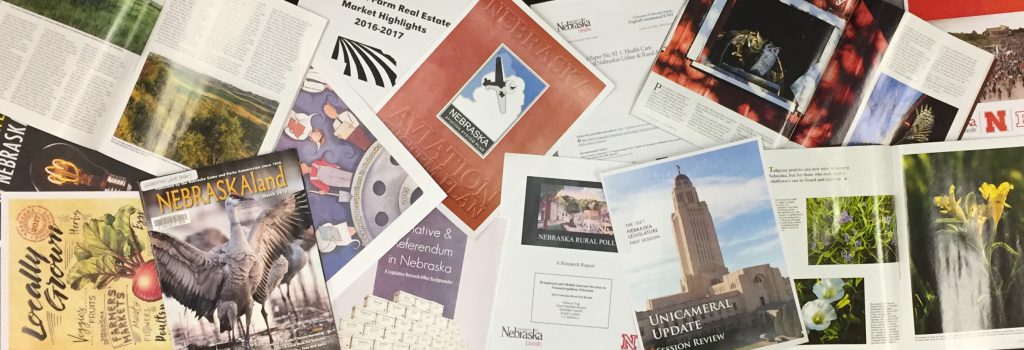
New state agency publications have been received at the Nebraska Library Commission for November and December, 2024. Included are reports from the Nebraska Board of Barber Examiners, the Nebraska Board of Engineers and Architects, the Nebraska Children’s Commission, Nebraska’s Coordinating Commission for Postsecondary Education, and the Nebraska Office of Violence Prevention, to name a few.
With the exception of the University of Nebraska Press titles, items are available for immediate viewing and printing by clicking directly in the .pdf below. The University of Nebraska Press titles can be checked out by librarians for their patrons here: Online Catalog.
The Nebraska Legislature created the Nebraska Publications Clearinghouse in 1972 as a service of the Nebraska Library Commission. Its purpose is to collect, preserve, and provide access to all public information published by Nebraska state agencies. By law (State Statutes 51-411 to 51-413) all Nebraska state agencies are required to submit their published documents to the Clearinghouse. For more information, visit the Nebraska Publications Clearinghouse page, contact Mary Sauers, Government Information Services Librarian; or contact Bonnie Henzel, State Documents Staff Assistant.
Posted in Books & Reading, Education & Training, General, Information Resources, What's Up Doc / Govdocs
Tagged books, GovDocs, Reading
Leave a comment
#BookFaceFriday “Attack of the Black Rectangles” by Amy Sarig King
This #BookFaceFriday can handle the truth!
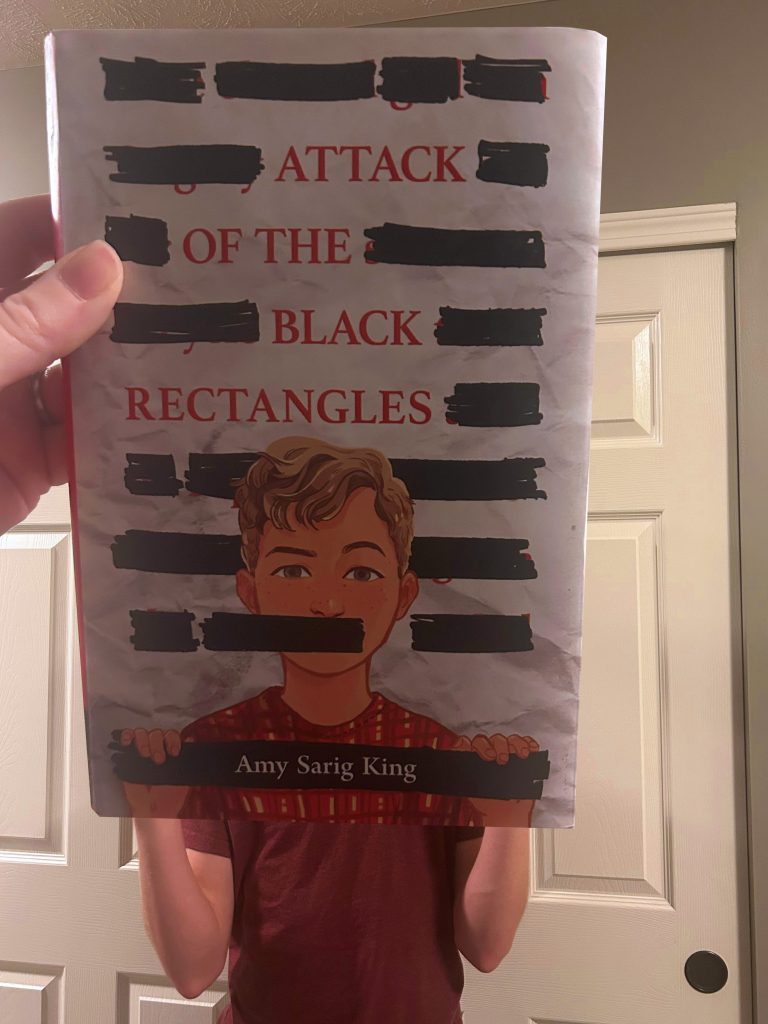
“Sixth graders stand up against censorship and systemic bias… The protagonists clarify the various issues for readers who may not be aware of them, and the story skillfully encourages keeping open minds and extending grace to the oblivious and hostile alike… A searingly relevant opus to intellectual freedom.”
— Kirkus Reviews
Libraries participating in the Nebraska OverDrive Libraries Group currently have access to a shared and growing collection of digital downloadable audiobooks and eBooks. 194 libraries across the state share the Nebraska OverDrive collection of 26,898 audiobooks, 36,794 ebooks, and 5,133 magazines. As an added bonus it includes 130 podcasts that are always available with simultaneous use (SU), as well as SU ebooks and audiobook titles that publishers have made available for a limited time. If you’re a part of it, let your users know about this great title, and if you’re not a member yet, find more information about participating in Nebraska Overdrive Libraries!
Love this #BookFace & reading? Check out our past #BookFaceFriday photos on the Nebraska Library Commission’s Facebook page!
#BookFaceFriday “New Year’s Eve Murder” by Leslie Meier
Ringing in a new #BookFaceFriday!
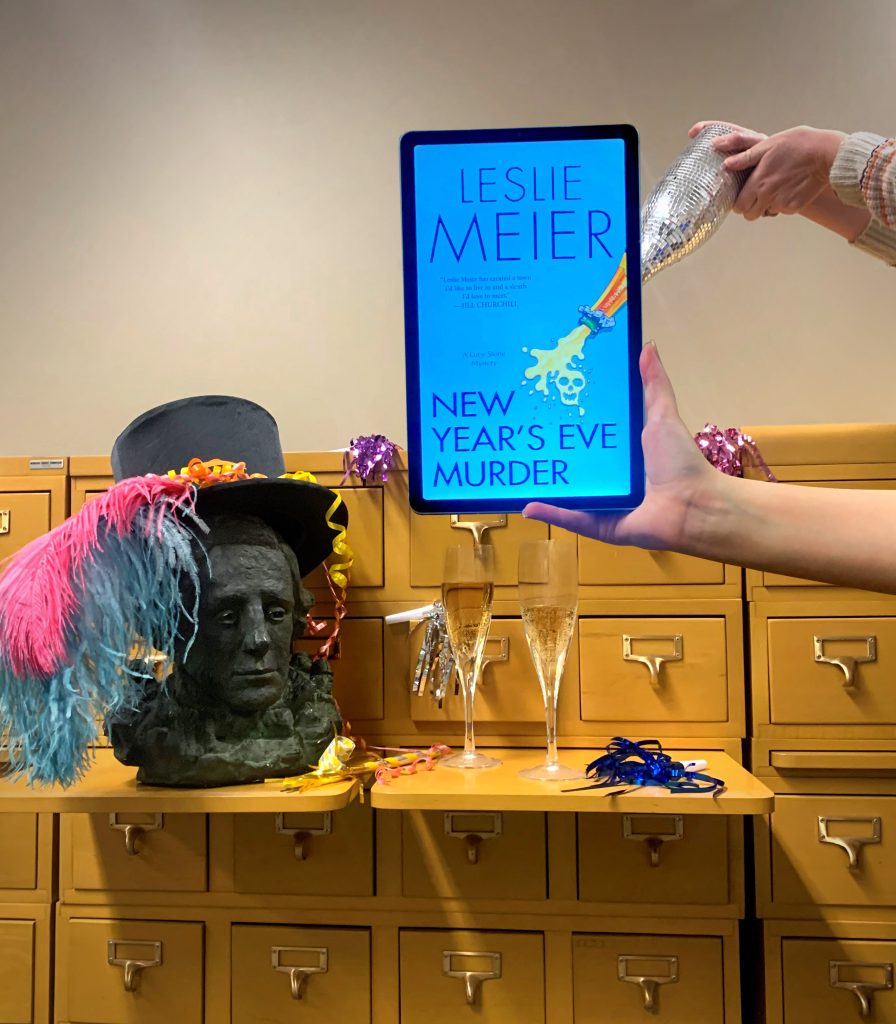
Happy New Year from the Nebraska Library Commission! Ring in the New Year with all new reading goals, like read 100 books this year, try a new genre each month, or even to save some dough by reading free books at your library. Make sure you get the Libby App downloaded on that brand-new Kindle or iPad you got for Christmas; all you need is a library card to read all the amazing books available on Nebraska OverDrive Libraries. One of those great titles is “New Year’s Eve Murder: A Lucy Stone Mystery” by Leslie Meier (Kensington Pub Corp, 2005,) available as an ebook and audiobook. It’s the twelfth novel in the Lucy Stone Mystery series, with 31 books total, and you can find them all on OverDrive!
“In Meier’s solid 12th cozy to feature Tinker’s Cove, Maine, reporter Lucy Stone (after 2004’s Star Spangled Murder), Lucy and her oldest daughter, Elizabeth, travel to New York City after winning an all-expenses-paid mother-daughter makeover from Jolie magazine. But after arriving in the Big Apple, the duo find the contest is fraught with cattiness, tension and mistrust, complicated by the magazine’s haughty editor and bickering staff. The outing turns into a nightmare after Jolie’s controversial fashion editor suddenly dies and Elizabeth falls ill from what turns out to be exposure to anthrax. Dividing her time between her daughter’s bedside and sleuthing, Lucy discovers a host of misdeeds involving real estate deals, animal rights and long-held secrets. Fans won’t mind that Meier’s light tone is sometimes at odds with the serious hot-button issues she raises.”
— Publishers Weekly
Libraries participating in the Nebraska OverDrive Libraries Group currently have access to a shared and growing collection of digital downloadable audiobooks and eBooks. 194 libraries across the state share the Nebraska OverDrive collection of 26,898 audiobooks, 36,794 ebooks, and 5,133 magazines. As an added bonus it includes 130 podcasts that are always available with simultaneous use (SU), as well as SU ebooks and audiobook titles that publishers have made available for a limited time. If you’re a part of it, let your users know about this great title, and if you’re not a member yet, find more information about participating in Nebraska Overdrive Libraries!
Love this #BookFace & reading? Check out our past #BookFaceFriday photos on the Nebraska Library Commission’s Facebook page!
Friday Reads: A Court of Thorns and Roses, by Sarah J. Maas
Recently I was with one of my daughters, and asked her what she was currently reading. The conversation that followed was all about the book genre that both my daughters have fallen completely in love with: Fantasy Romance. In general this is not a genre I’ve been drawn to, but they are so enthusiastic about it I thought I would give one a try. A Court of Thorns and Roses was the one recommended I read first, so I jumped out of my comfort zone and read something different. I will admit that it was a fun read, with faeries, demons, magic, and adventure galore. I both read and listened to it, and enjoyed both. Sarah J. Maas is an excellent writer, and it was easy to imagine the settings, characters, and story.
“When nineteen-year-old huntress Feyre kills a wolf in the woods, a terrifying creature arrives at her house to demand retribution. She is dragged away from her family to a treacherous magical land she knows about only from legends. There, Feyre discovers that her captor is not truly a beast, but one of the lethal, immortal faeries who once ruled her world. At least, he’s not a beast all the time. As she adapts to her new home, her feelings for the faerie, Tamlin, transform from icy hostility into a fiery passion that burns through every lie she’s been told about the beautiful, dangerous world of the Fae. But something is not right in the faerie lands. An ancient, wicked shadow is growing, and Feyre must find a way to stop it or doom Tamlin—and his world—forever. “
A Court of Thorns and Roses is the first in a series of five books. Ms. Maas has written four series in the Fantasy Romance genre, and there are other authors to choose from as well: Rebecca Yarros, Raven Kennedy, and Callie Hart just to name a few. There are also titles in this genre available to our Talking Book and Braille patrons–just search in BARD, or call your reader advisor. Enjoy! **Synopsis courtesy of Amazon and Audible.
Book Club Spotlight – Miracle in the Andes
On October 12th, 1972, a chartered plane of 45 college-aged rugby players and friends crashed deep into the Andes mountains. And 10 weeks later, sixteen would make it home. Among those in the crash were Nando Parrado, his mother, and his sister. But only Parrado would survive. Now a successful businessman, Parrado and his co-author Vince Rause, tell his personal story of the crash in today’s spotlight Miracle in the Andes. Expanding from the famous account, Alive by Piers Paul Read, the pair focus on the emotional toil, and teamwork that got the boys through the most impossible of circumstances instead of the more sensational aspects. Like many of his fellow survivors, Nando now travels as a motivational speaker, relaying his experience of survival and suffering to connect with others and heal emotional wounds.
“I come from a plane that fell into the mountains.” When Nando Parrado woke up, there was darkness. From an affluent area on the warm coast of Uruguay, he was a member of a rugby team flying to a friendly match in Chile, but now there was only darkness, pain, and incredible cold. Stranded amongst the remains of their plane, the survivors had to brave the freezing Andes wholly unprepared. The looming mountains were no place for them, and they were doomed to be snuffed out if someone didn’t act fast. With his mother and sister now buried beneath the snow, and no rescue in sight, Nando’s sole focus in life was to make it home to his grieving father, even if that meant hiking the vast Andes in rugby cleats. On the mountain, the team had to do the unthinkable to survive in this moving story of perseverance, sacrifice, and love.
“The mountains, for all their power, were not stronger than my attachment to my father. They could not crush my ability to love.”
Nando Parrado
The ill-fated Uruguayan Air Force Flight 571 has spawned books, documentaries, and the award-winning movies “Alive” (1993) and “Society of the Snow” (2023). Parrado’s Miracle in the Andes uniquely chronicles the indomitable human spirit in the bleakest conditions. He showcases how the community and camaraderie of the rugby team ultimately kept them alive. And it was because of their humor, strength, friendship, and trust forged on the rugby pitch that they made it home. Parrado’s insights into the human condition and mind during the ordeal are the highlights of this book. While trying to survive the harsh climate, the young men have deep theological and political discussions about life and their Catholic upbringing. Our Book Club copies also feature a 2022 introduction by Parrado and photograph inserts that chronicle their daily lives, their rescue, and beyond. Adventurous Book Clubs will find the moral quandaries presented in this book challenging but captivating. Why do some survive and others do not? Are we obligated to do everything we can to stay alive, even if that means breaking taboo?
Further Listening:
- “You’re Wrong About” Podcast: Survival in the Andes with Blair Braverman
If you’re interested in requesting Miracle in the Andes for your book club, you can find the Request Form here. There are 5 copies. (A librarian must request items)
Parrado, Nando. Miracle in the Andes. Penguin Random House. 2006
Book Briefs: New University of Nebraska Press Books at the Nebraska Publications Clearinghouse
The Nebraska Publications Clearinghouse receives documents every month from all Nebraska state agencies, including the University of Nebraska Press (UNP). UNP books, as well as all Nebraska state documents, are available for checkout by libraries and librarians for their patrons.
Here are the UNP books the Clearinghouse received in November and December, 2024:
Colonialism and Literature : An Affective Narratology, by Patrick Colm Hogan. Series: Frontiers of Narrative
In earlier work Patrick Colm Hogan argued that a few story genres—heroic, romantic, sacrificial, and others—recur prominently across separate literary traditions. These structures recur because they derive from important emotion-motivation systems governing human social interaction, such as group pride and shame.
In Colonialism and Literature Hogan extends this work to argue that these genres play a prominent role in the fashioning of postcolonization literature—literature encompassing both the colonial and postcolonial periods. Crucially, colonizers and colonized people commonly understand and explain their situation in terms of these narrative structures. In other words, the stories we tell to some degree simply reflect the facts. But we also tend to interpret our condition in terms of genre, with the genre guiding us about what to record and how to evaluate it. Hogan explores these consequential processes in theoretical and literary analysis, presenting extended, culturally and historically specified interpretations of works by Pádraic Pearse (Ireland), Ngũgĩ wa Thiong’o (Kenya), Yasujiro Ozu (Japan), J. M. Coetzee (South Africa), Margaret Atwood (Canada), Rabindranath Tagore (India), Abderrahmane Sissako (Mali), and Dinabandhu Mitra (India).
Contemporary Humanistic Judaism : Beliefs, Values, Practices, edited by Adam Chalom and Jodi Kornfeld. Series: JPS Anthologies of Jewish Thought
Opening up multidimensional ideas, values, and practices of Humanistic Judaism to Jews of all backgrounds and beliefs, Contemporary Humanistic Judaism collects the movement’s most important texts for the first time and answers the oft-raised question, “How can you be Jewish and celebrate Judaism if you don’t believe in God?” with new vision.
Part 1 (“Beliefs and Ethics”) examines core positive beliefs—in human agency, social progress, ethics without supernatural authority, sources of natural transcendence, and Humanistic Jews’ own authority to remake their traditional Jewish inheritance on their own terms “beyond God.” Part 2 (“Identity”) discusses how Humanistic Judaism empowers individuals to self-define as Jews, respects people’s decisions to marry whom they love, and navigates the Israel-Diaspora relationship. Part 3 (“Culture”) describes how the many worlds of Jewish cultural experience—art, music, food, language, heirlooms—ground Jewishness and enable endless exploration. Part 4 (“Jewish Life”) applies humanist philosophy to lived Jewish experience: reimagined creative education (where students choose passages meaningful to them for their bar, bat, or b mitzvah [gender-neutral] celebrations), liturgy, life cycle, and holiday celebrations (where Hanukkah emphasizes the religious freedom to believe as one chooses).
Jewish seekers, educators, and scholars alike will come to appreciate the unique ideologies and lived expressions of Humanistic Judaism.
Great Plains Ethnohistory : New Interdisciplinary Approaches, edited by Rani-Henrik Andersson, Thierry Veyrié, and Logan Sutton. Series: Studies in the Anthropology of North American Indians
Great Plains Ethnohistory offers a collection of state-of-the-field work in Great Plains ethnohistory, both contemporary and historical, covering the traditional anthropological subfields of ethnography, cultural history, archaeology, and linguistics. As ethnohistory matured into an interdisciplinary endeavor in the 1950s with the formation of the American Society for Ethnohistory, historians and anthropologists developed scholarly methodology for the study of Native American societies from their own points of view. Within this developing framework, Native cultures of the Great Plains represented a foundational research area.
Great Plains Ethnohistory pays intellectual debts to Raymond J. DeMallie and Douglas R. Parks, whose research from the 1970s onward brought ethnohistorical approaches to the study of Native cultures, histories, and languages into the international community of the humanities and social sciences, sciences, and arts. The work of the scholars assembled in this volume advocates for an ethnohistory that continues to decompartmentalize Indigenous knowledge and scholarly methodologies, including some of the constructs, biases, and prejudices perpetuated within traditional scholarly disciplines.
Including essays by Gilles Havard, Joanna Scherer, Sebastian Braun, Brad KuuNUx TeeRIt Kroupa, and DeMallie and Parks themselves, among others, plus an afterword by Philip J. Deloria, this is an essential contribution to the scholarly field and a volume for undergraduate and graduate students and scholars who study Native American and Indigenous cultures.
Hell-Bent for Leather : Sex and Sexuality in the Weird Western, edited by Kerry Fine, Michael K. Johnson, Rebecca M. Lush and Sara L. Spurgeon. Series: Postwestern Horizons
Hell-Bent for Leather: Sex and Sexuality in the Weird Western builds on the Locus Award finalist Weird Westerns: Race, Gender, Genre. This new collection takes a deep dive into the myriad ways sex and sexuality are imagined in weird western literature, film, television, and video games, paying special attention to portrayals of power and privilege. The contributors explore weird western challenges to assumptions about varied genders and sexualities, drawing our attention to how the western can reinforce existing gender and sexual paradigms or overturn them in delightful, terrifying, or unexpected ways.
Primary texts range from CBS’s campy BDSM-inflected steampunk western The Wild Wild West to the Star Wars franchise’s popular leather-daddy bounty hunter The Mandalorian, from Ishmael Reed’s satirical postmodern western Yellow Back Radio Broke-Down to C Pam Zhang’s acclaimed novel How Much of These Hills Is Gold. Chapters engage texts from Australia and Great Britain, classic horror like The Texas Chain Saw Massacre, the popular video games BioShock Infinite and The Last of Us II, and less well-known texts like Laguna Pueblo–Navajo author A. A. Carr’s erotic vampire/monster slayer western Eye Killers.
Public Land and Democracy in America : Understanding Conflict Over Grand Staircase-Escalante National Monument, by Julie Brugger. Series: Anthropology of Contemporary North America
In recent years the Grand Staircase-Escalante National Monument in southern Utah has figured prominently in the long and ongoing struggle over the meaning and value of America’s public lands. In 1996 President Bill Clinton used the Antiquities Act to create the monument, with the goal of protecting scientific and historical resources. His action incensed Utah elected officials and local residents who were neither informed nor consulted beforehand, and opposition to the monument has continued to make its day-to-day management problematic. In 2017 President Donald Trump reduced the monument’s size, an action immediately challenged by multiple lawsuits; subsequently, President Joe Biden restored the monument in 2021.
In Public Land and Democracy in America Julie Brugger brings into focus the perspectives of a variety of groups affected by conflict over the monument, including residents of adjacent communities, ranchers, federal land management agency employees, and environmentalists. In the process of following management disputes at the monument over the years, Brugger considers how conceptions of democracy have shaped and been shaped by the regional landscape and by these disputes.
Through this ethnographic evidence, Brugger proposes a concept of democracy that encompasses disparate meanings and experiences, embraces conflict, and suggests a crucial role for public lands in transforming antagonism into agonism.
Taking Charge, Making Change : Native People and the Transition of Education from Stephan Mission to Crow Creek Tribal School, by Robert W. Galler, Jr. Series: Indigenous Education
Taking Charge, Making Change gives voice to generations of Native people—from Crow Creek, Lower Brule, and other reservations in North Dakota and South Dakota—who shaped a school originally designed to foster Catholicism and assimilation. Local initiatives and collaboration transformed the Catholic Stephan Mission boarding school into the Crow Creek Tribal School, which now features both tribal traditions and American educational programs.
Through archival research and interviews with parents, graduates, teachers, and staff at Crow Creek and the surrounding community, Robert W. Galler Jr. places Native students at the heart of the narrative, demonstrating multifaceted family connections at a nineteenth-century, on-reservation religious school that evolved into a tribally run institution in the 1970s. He shows numerous ways that community members worked with Catholic leaders and ultimately transformed their mindsets and educational approaches over nearly a century. While recognizing the many challenges and tragedies that Native students endured, Galler highlights the creativity, collaborations, and contributions of the students and graduates to their communities.
Taking Charge, Making Change shows how individuals and families helped to found the school, maintain enrollment, secure funding, and influence school policies. Its graduates went on to serve with distinction in the U.S. military, earn advanced degrees after college, join and lead tribal councils in North and South Dakota, help their communities push back against federal policies, and continue to run their own education system.
The Windflower Home Almanac of Poetry, edited by Ted Kooser.
The Windflower Home Almanac of Poetry is an anthology of poems originally selected by Ted Kooser in 1980 and published by his Windflower Press, a small, independent publisher that specialized in poetry from the Great Plains. The collection contains almost two hundred poems from dozens of poets and was designed to resemble a commonplace farmer’s almanac.
The Windflower Press was the sole operation of Kooser, who was later named the first U.S. poet laureate from the Great Plains. His press gained national recognition for highlighting the work of the region’s young poets, and its Windflower Home Almanac of Poetry earned notice from the Library Journal as one of its era’s best small press books.
**Pictures and Synopses courtesy of University of Nebraska Press.
#BookFaceFriday “First Dog’s White House Christmas” by J. Patrick Lewis and Beth Zappitello
You can keep the Christmas lights up till January with this #BookFaceFriday!
Merry Christmas and Happy Holidays from the Nebraska Library Commission! As you’re setting up all those new tablets, Ereaders, and phones that were unwrapped on Christmas morning, don’t forget to download the Libby App and link your Library Card. You’re whole family can have access to free books through your library, and that includes picture books for your youngest kids like this week’s #BookFace “First Dog’s White House Christmas” written by J. Patrick Lewis and Beth Zappitello, and illustrated by Tim Bowers (Sleeping Bear Press, 2010). It’s available as a an eBook through Nebraska OverDrive Libraries: Kids & Teens, and can be found in the specially curated collection “Get Wrapped Up in a Good Book??: Juvenile Holiday Reads,” which is filled with holiday themed titles for kids and teens.
“In this wonderful picture book, the authors give readers a delightfully dog-centric picture of a Christmas gala at the White House. Readers will learn about Christmas traditions from many lands around the world, and they will also come to appreciate that though traditions might be different, the meaning of Christmas is the same the world over, if you are human or canine.”
— Marya Jansen-Gruber, Through the Looking Glass
Libraries participating in the Nebraska OverDrive Libraries Group currently have access to a shared and growing collection of digital downloadable audiobooks and eBooks. 194 libraries across the state share the Nebraska OverDrive collection of 26,898 audiobooks, 36,794 ebooks, and 5,133 magazines. As an added bonus it includes 130 podcasts that are always available with simultaneous use (SU), as well as SU ebooks and audiobook titles that publishers have made available for a limited time. If you’re a part of it, let your users know about this great title, and if you’re not a member yet, find more information about participating in Nebraska Overdrive Libraries!
Love this #BookFace & reading? Check out our past #BookFaceFriday photos on the Nebraska Library Commission’s Facebook page!
#BookFaceFriday “All Wrapped Up” by Holly Smale
Don’t get your tinsel in a tangle it’s #BookFaceFriday!
Winter break is almost upon us and it’s the perfect time to get your kids set up to check out ebooks and audiobooks while they’re at home for holiday break. Even if winter weather ruins your regular trip to the library you and your kids can still enjoy new books like “All Wrapped Up: A Geek Girl Special” by Holly Smale (HarperCollinsChildren’sBooks, 2022). It’s available as an eBook through Nebraska OverDrive Libraries: Kids & Teens, and can be found in the specially curated collection “Get Wrapped Up in a Good Book??: Juvenile Holiday Reads,” which is filled with Holiday themed titles for kids and teens.
“A feel-good satisfying gem that will have teens smiling from cover to cover, and walking a little taller after reading”
— Books for Keeps
Libraries participating in the Nebraska OverDrive Libraries Group currently have access to a shared and growing collection of digital downloadable audiobooks and eBooks. 194 libraries across the state share the Nebraska OverDrive collection of 26,898 audiobooks, 36,794 ebooks, and 5,133 magazines. As an added bonus it includes 130 podcasts that are always available with simultaneous use (SU), as well as SU ebooks and audiobook titles that publishers have made available for a limited time. If you’re a part of it, let your users know about this great title, and if you’re not a member yet, find more information about participating in Nebraska Overdrive Libraries!
Love this #BookFace & reading? Check out our past #BookFaceFriday photos on the Nebraska Library Commission’s Facebook page!
Book Club Spotlight – Know My Name
Chanel Miller. You might not know her name, but you know her story. Identified only as “Emily Doe”- her Victim Impact Statement has been viewed over 18 million times, translated worldwide, read, and referenced on news stations and the halls of government. In her beautiful and heartbreaking memoir, Know My Name, Miller comes forward for the first time as the sexual assault victim of Brock Turner to tell her story under her own name. This 2019 National Book Critics Circle Award Winner shines with a cover of striking teal laced with cracks of gold, reminiscent of the ancient Japanese art of Kintsugi– an act of giving new and beautiful life to what was once broken.
In 2015, Chanel Miller woke up in a hospital bed. Standing over her was a Stanford Dean and a Police Officer- they told her she was found passed out with a man looming over her at a party the night before. Still confused and groggy, Chanel was probed, examined, photographed, and asked if she wanted to press charges without telling her what for. Trying to be helpful… Chanel agreed. What followed was over a year of protracted trial dates and a bloodthirsty media waiting to tear her apart. Her assailant found guilty on all three felony counts of sexual assault, only served three months in county jail. Any longer, and the judge worried that it could affect the “bright future” in store for the ambitious swimmer Brock Turner. Basing the sentencing on a theoretical future and disregarding the real harm he caused to another person with a future of her own.
The case of The People V. Brock Allen Turner sent shockwaves across the United States and college campuses. Pushback from the sentencing led to California enacting laws to expand protections for victims, the people prevailing where the system had not. Through Know My Name, we see the fallout Chanel experiences from agreeing to pursue the case. Feelings of total isolation, threats of violence, and the loss of dignity were thrust upon her by a system crafted against survivors. But her story is also about the love and hope she found in her family, this new community of survivors, and the people working for change.
“They seemed angry that I’d made myself vulnerable, more than the fact that he’d acted on my vulnerability.”
― Chanel Miller
Luckily, Miller’s story does not begin or end with Brock Turner’s actions that night. She is a daughter, an older sister, and a friend. She is an artist and a writer. She is a young woman in the 21st century. Miller’s story of going through the trial process is fascinating and heartbreaking. She was constantly afraid of saying the wrong thing, being too emotional, or not emotional enough. Her empathy and fear for Turner’s mental state are regarded as actions of passivity. As a survivor, Miller was especially vulnerable; as a young half-Chinese woman with no legal experience, she was taken advantage of by the systems of power. But the people fought back. Book Club Groups who were fans of memoirs like Educated and The Glass Castle can discuss the changing tide of how we react to and define violence towards women and how this novel gives a voice to millions of voiceless people. In Know My Name, Miller is smart, funny, and most of all, human. Holding a BA in Literature, Miller has been surrounded her whole life by incredibly intelligent women writers, and it shines in her own writing. Today, she continues to write and create art with her critically acclaimed 2024 Middle-Grade Fiction Book, Magnolia Wu Unfolds It All.
More from Chanel Miller:
- Short film: “I Am With You”
- 60 Minutes: “Chanel Miller’s Story“
- Chanel’s Victim Impact Statement (also printed in the book)
If you’re interested in requesting Know My Name or your book club, you can find the Request Form here. There are 8 copies. (A librarian must request items)
Miller, Chanel. Know My Name. Penguin Random House. 2019
#BookFaceFriday “Unlucky 13” by James Patterson & Maxine Paetro
This #BookFaceFriday can see the writings on the wall!
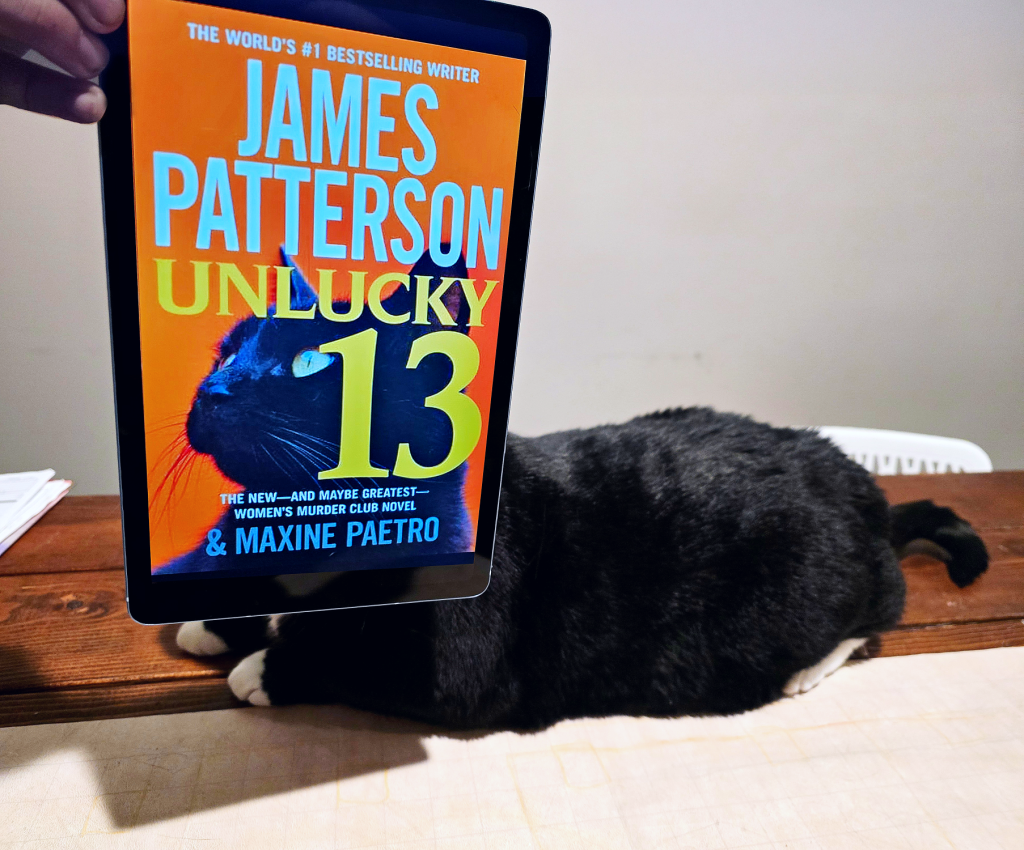
This week’s #BookFaceFriday isn’t superstitious at all! Happy Friday the Thirteenth, if you’re avoiding black cats, walking under ladders, or opening umbrellas indoors, this BookFace is not for you! Check out “Unlucky 13” by James Patterson and Maxine Paetro (Grand Central Publishing, 2015) it’s the thirteenth installment in Patterson’s “Women’s Murder Club” series. San Francisco Detective Lindsay Boxer is hoping the luck is on her side in this murder mystery thriller. We think your luck is changing because it’s available as a an eBook and Audiobook through Nebraska OverDrive Libraries, and can be found alongside the entire twenty four book “Women’s Murder Club” series all on OverDrive.
“Those who haven’t read any of the novels in the Women’s Murder Club series are cheating themselves.”
— BookReporter.com
Libraries participating in the Nebraska OverDrive Libraries Group currently have access to a shared and growing collection of digital downloadable audiobooks and eBooks. 194 libraries across the state share the Nebraska OverDrive collection of 26,898 audiobooks, 36,794 ebooks, and 5,133 magazines. As an added bonus it includes 130 podcasts that are always available with simultaneous use (SU), as well as SU ebooks and audiobook titles that publishers have made available for a limited time. If you’re a part of it, let your users know about this great title, and if you’re not a member yet, find more information about participating in Nebraska Overdrive Libraries!
Love this #BookFace & reading? We suggest checking out all the titles available for book clubs at http://nlc.nebraska.gov/ref/bookclub. Check out our past #BookFaceFriday photos on the Nebraska Library Commission’s Facebook page!
Friday Reads: One of Us Knows, by Alyssa Cole
Kenetria Nash finds herself on her way to her new historical preservationist job, as an archivist for a noteworthy home on an island in the Hudson River, with no memory of what’s happened for the past six years—including applying for, or accepting, this new position. A position that seems too perfect to be real. A huge storm is about to hit the island and any boats trying to reach it, cell service is out, and Kenetria—who goes by Ken—is going to have to dig deep for answers, but not in the way the reader might expect.
Alyssa Cole takes an innovative approach to worldbuilding in One of Us Knows, with most of the characters in the book all existing inside one person, Ken. Ken experiences dissociative identity disorder (DID), which used to be known as multiple personality disorder. In this story, all of Ken’s identities, or alters, are fleshed-out characters with motivations, strengths and weaknesses–and while some of them do communicate with each other directly, the whole group has agreed to maintain their system’s communication and survival with an online journal. Some of the alters are behaving in unexpected ways, though—which might be as a result of stress brought on by the fairly new COVID epidemic (the book is set in 2022), or because of something else entirely. But could one of the alters be a murderer? Ken also finds herself in the position of having to figure that out, to save herself and her system.
Cole keeps the internal and external action going at a dizzying but well-sorted clip, and pokes fun at expected psychological horror, thriller, and haunted house tropes. The characters experience parallels between the COVID pandemic and the 1918 influenza epidemic, which affected the original inhabitants of the creepy, castle-like house—the notorious house that hosts much of the action, in more ways than one. Some of the alters use humor as a defense mechanism, which makes for plenty of wisecracks as the mystery of their trauma unfolds, and as the suspense builds. The pace moves fast enough that the reader doesn’t have time to guess what’s around every turn, and most of those guesses would be wrong, anyway. A fresh, unabashed thriller that tackles heavy topics with a deft touch, One of Us Knows is a great read for a stormy weekend.
Cole, A. (2024). One of us knows : a thriller (First edition). William Morrow, an imprint of HarperCollins Publishers.
#BookFaceFriday “Stormbreaker” by Anthony Horowitz
Saving the world one #BookFace at a time!
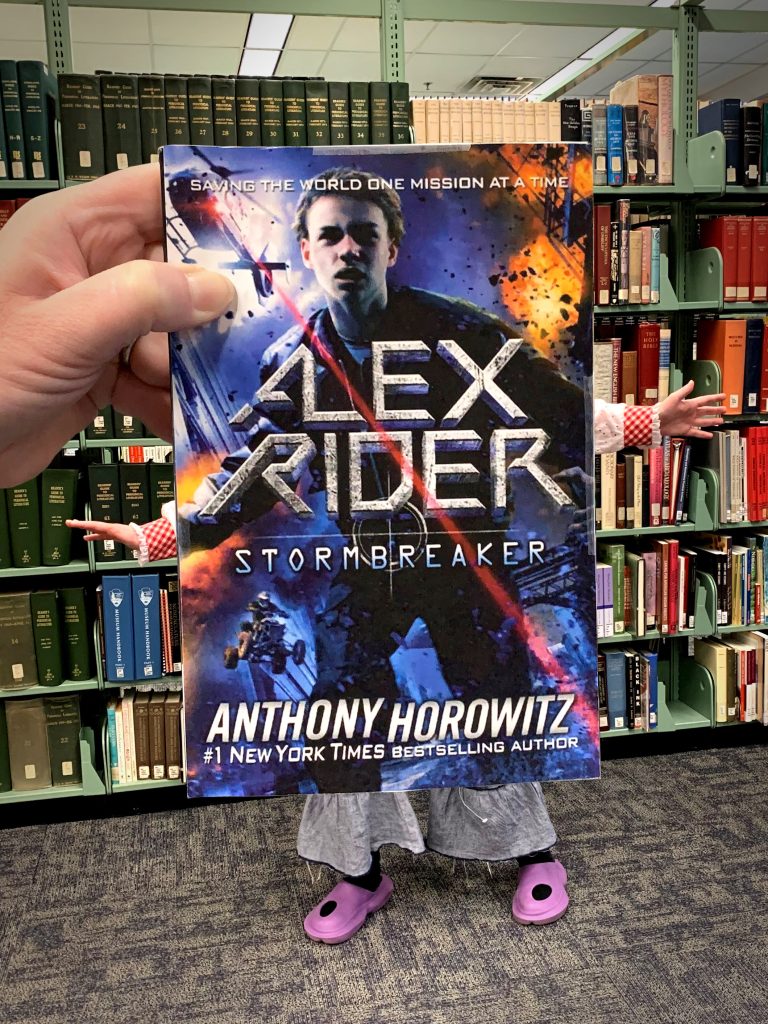
“Readers will cheer for Alex Rider, the 14-year-old hero of British author Horowitz’s spy thriller (the first in a projected series). When his guardian and uncle, Ian, is mysteriously killed, Alex discovers that his uncle was not the bank vice-president he purported to be, but rather a spy for the British government.”
— Publishers Weekly
Book Club Kits Rules for Use
- These kits can be checked out by the librarians of Nebraska libraries and media centers.
- Circulation times are flexible and will be based upon availability. There is no standard check-out time for book club kits.
- Please search the collection to select items you wish to borrow and use the REQUEST THIS KIT icon to borrow items.
- Contact the Information Desk at the Library Commission if you have any questions: by phone: 800/307-2665, or by email: Information Services Team
Love this #BookFace & reading? Check out our past #BookFaceFriday photos on the Nebraska Library Commission’s Facebook page!
Posted in Books & Reading, General
Tagged Alex Rider Series, Anthony Horowitz, Audiobook, Book Club Kits, bookfacefriday, Ebook, Novel, Reading, Stormbreaker, YA books
Leave a comment
